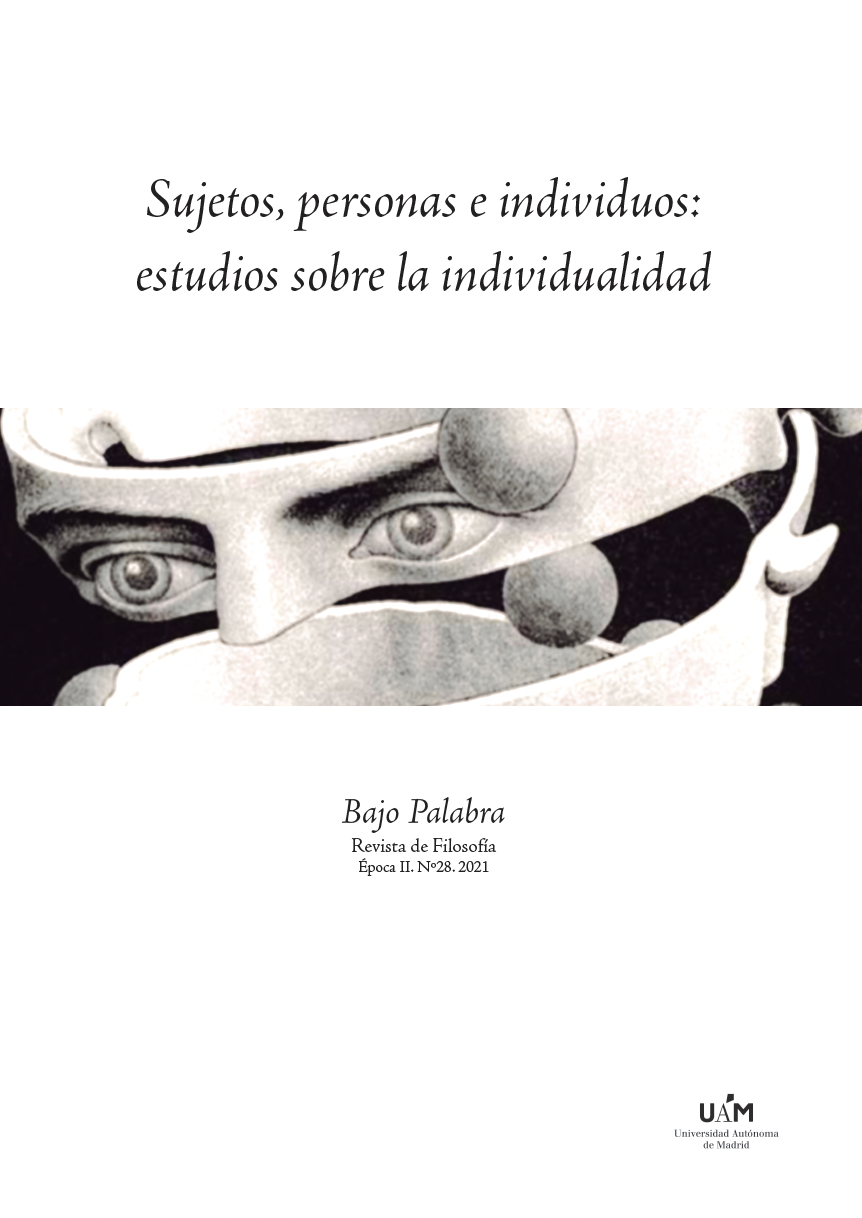The Physical, the Subjective, and the Social in the Debate on Personal Identity: A Critical and Historical Overview of Neo-Lockean Accounts: Lo físico, lo subjetivo y lo social en el debate sobre la identidad personal: Una visión crítica e histórica de las teorías neolockeanas
Parole chiave:
Personal identity, neo-Lockean theories, History, NarrativismCopyright (c) 2021 Alejandro Borrás Ruiz

TQuesto lavoro è fornito con la licenza Creative Commons Attribuzione 4.0 Internazionale.
Abstract
There are, at least, three fundamental
dimensions in what we all are: a physical,
a mental and a social dimension. In this
paper I will focus in how, in the history
of the debate about personal identity, different neo-Lockean theories have tried
to account for these dimensions. The
main goal will be to show that the only
neo-Lockean theory that can account for
these dimensions is what I call the New
Narrative Approach, that establishes a
distinction between three entities that
we are: human beings, selves, and persons.
Downloads
Riferimenti bibliografici
Bruner, J. S. (1986). Actual Minds, Possible Worlds. Harvard University Press.
DOI: https://doi.org/10.4159/9780674029019
Bruner, J. S. (1987). Life as Narrative. Social Research, 54(1), 11-32.
Bruner, J. S. (1991). The Narrative Construction of Reality. Critical Inquiry,
(1), 1-21. DOI: https://doi.org/10.1086/448619
Butler, J. (2008). Of Personal Identity. In J. Perry (Ed.), Personal Identity (pp.
-106). University of California Press.
Dennett, D. C. (1991). Consciousness Explained. Brown and Company.
Flew, A. (1951). Locke and the Problem of Personal Identity. Philosophy, 26(96),
-68. DOI: https://doi.org/10.1017/S0031819100019203
Frisch, M. (2006). I am not Stiller. Dalkey.
Grice, H. P. (1941). Personal Identity. Mind, 50(200), 330-350. DOI: https://
doi.org/10.1093/mind/L.200.330
Gutiérrez Aguilar, R. (2019). Facing Boredom: Essential Indexicals and Narratives of the Self. En J. Ros Velasco (Ed.). Boredom Is in Your Mind: A Shared
Psychological-Philosophical Approach (pp. 123-134). Cham-Switzerland: Springer
Nature. DOI: https://doi.org/10.1007/978-3-030-26395-9_8
Hofstadter, D. R., & Dennett, D. C. (Eds.). (1981). The Mind’s I: Fantasies and
Reflections on Self and Soul. Penguin.
Johnston, M. (2010). Surviving Death. Princeton University Press. DOI: https://
doi.org/10.1515/9781400834600
Locke, J. (1975). An Essay Concerning Human Understanding. Oxford University
Press.
MacIntyre, A. (2007). After Virtue: A Study in Moral Theory (Third Edition.).
University of Notre Dame Press.
McDowell, J. (1997). Reductionism and the First Person. In J. Dancy (Ed.),
Reading Parfit (pp. 230-250). Blackwell.
Menary, R. (2008). Embodied Narratives. Journal of Consciousness Studies, 15(6),
-84.
—
Muñoz Corcuera, A. (2009). El caso de Memento: Una memoria nietzscheana
en el cine postmoderno. Bajo Palabra: Revista de Filosofía, 4, 181-190.
Muñoz-Corcuera, A. (2021a). Persistence Narrativism and the Determinacy of
Personal Identity. Philosophia, 49(2): 723-739. DOI: https://doi.org/10.1007/
s11406-020-00265-8
Muñoz-Corcuera, A. (2021b). Narrativism, Reductionism, and Four-Dimensionalism. Agora: Papeles de Filosofía, 40(2), 63-86. DOI: https://doi.
org/10.15304/ag.40.2.6713
Nozick, R. (1981). Philosophical Explanations. Harvard University Press.
Olson, E. T. (1997). The Human Animal: Personal Identity Without Psychology.
Oxford University Press.
Parfit, D. (1984). Reasons and Persons. Oxford University Press.
Reid, T. (2008). Of Mr. Locke’s Account of Our Personal Identity. In J. Perry
(Ed.), Personal Identity (pp. 113-118). University of California Press.
Ricoeur, P. (1984). Time and Narrative I. University of Chicago Press. DOI:
https://doi.org/10.7208/chicago/9780226713519.001.0001
Ricoeur, P. (1994). Oneself as Another. University of Chicago Press.
Rudd, A. (2007). In Defence of Narrative. European Journal of Philosophy, 17(1),
-75. DOI: https://doi.org/10.1111/j.1468-0378.2007.00272.x
Schechtman, M. (1996). The Constitution of Selves. Cornell University Press.
Schechtman, M. (2001). Empathic Access: The Missing Ingredient in Personal Identity. Philosophical Explorations, 4(2), 95-111. DOI: https://doi.
org/10.1080/10002001058538710
Schechtman, M. (2007). Stories, Lives and Basic Survival: A Refinement and
Defense of the Narrative View. In D. D. Hutto (Ed.), Narrative and Understanding Persons (pp. 155-178). Cambridge University Press. DOI: https://doi.
org/10.1017/CBO9780511627903.009
Shoemaker, S. (1970). Persons and Their Pasts. American Philosophical Quarterly, 7(4), 269-285.
Shoemaker, S. (1997). Parfit on Identity. In J. Dancy (Ed.), Reading Parfit (pp.
-148). Blackwell.
Stokes, P. (2013). Will it be me? Identity, concern and perspective. Canadian
Journal of Philosophy, 43(2), 206-226. DOI: https://doi.org/10.1080/0045509
2013.826054
Strawson, G. (2008). Against Narrativity. In Real Materialism and Other Essays (pp. 189-207). Oxford University Press. DOI: https://doi.org/10.1093/
acprof:oso/9780199267422.003.0008
Taylor, C. (2001). Sources of the Self: The Making of Modern Identity. Harvard
University Press.
Vice, S. (2003). Literature and the Narrative Self. Philosophy, 78(303), 93-108.
DOI: https://doi.org/10.1017/S0031819103000068
Williams, B. (1957). Personal Identity and Individuation. Proceedings of the
Aristotelian Society, 57, 229-252. DOI: https://doi.org/10.1093/aristotelian/57.1.229
Williams, B. (1970). The Self and the Future. The Philosophical Review, 79(2),
-180. DOI: https://doi.org/10.2307/2183946
Zahavi, D. (2007). Self and Other: The Limits of Narrative Understanding. In
D. D. Hutto (Ed.), Narrative and Understanding Persons (pp. 179-201) Cambridge University Press. DOI: https://doi.org/10.1017/S1358246100009668

